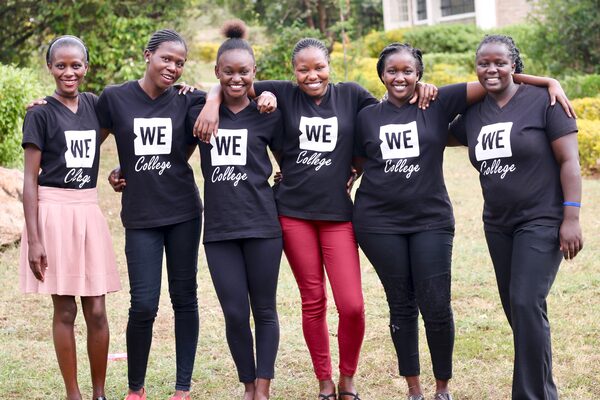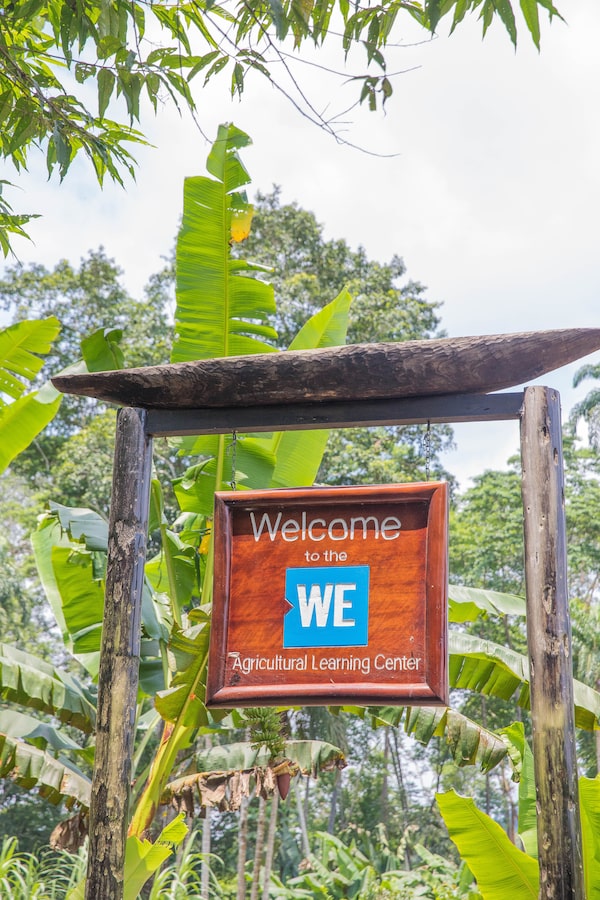
Students at the new WE College in Kenya’s Mara region are given the opportunity to overcome the social and economic hurdles that can often prevent them from enrolling in post-secondary education.WE
A group of students in the Ecuadorian Amazon discovered the rewards of entrepreneurship, following a bumper crop of cucumbers in their school garden. “They took the initiative to take produce and sell it at the weekly market [on their day off], with their teachers’ permission, to help pay for classroom activities,” says Natalia Argoti, WE Villages manager for the Amazon region.
WE’s food-security strategy includes introducing elementary school teachers and young families to more produce, including tomatoes, cucumbers, peppers, watermelon and pineapple.
“Due to the soil conditions, bugs and weather, it has been easiest to grow yucca, cacao, coffee and plantains, but this diet can be too heavy in carbs, so we need to make it better. We are introducing different produce [that local farmers and families] didn’t know they could grow,” Argoti says.
The students’ success is attributed to ME to WE Chocolate That Changes Lives, a social entrepreneurship program that goes beyond making fair-trade chocolate bars that are crafted from Ecuadorian Fino de Aroma cacao beans. While sustainably grown cacao provides farmers with living wages, the Agricultural Learning Center (ALC) teaches best practices to improve yields and help growers become financially independent.
Since opening in the village of Chone in 2017, the ALC is improving production on area farms. And “not just cacao, but other products, too,” says Argoti. “The intent is to reduce poverty and improve nutrition and food security,” she says.
By the end of 2019, the ALC will have trained approximately 100 farmers, along with numerous farmers benefiting from off-site community programs. She says cacao farmers who’ve trained at the ALC have gone on to train others, increasing the program’s regional impact.
Overseas, WE is building a school system to educate more local youth in the Maasai Mara region of Narok County, Kenya. According to UNICEF, nationwide primary school attendance hovers at around 72 per cent for boys and 75 per cent for girls.
At the secondary school level, enrolment drops sharply, at 51.6 per cent for boys and 48.4 per cent for girls. The postsecondary picture is bleak in the Narok County region, where just 0.42 per cent of Kenyan university students come from, although the area represents 2.28 per cent of Kenya’s population.
There are numerous hurdles preventing young Maasai Mara adults from accessing postsecondary education, says Fiona Achieng, associate director of WE College. Foremost is the cost of education. Girls and women face additional barriers, such as early and forced marriage, female genital mutilation, teen pregnancy, extensive household chores and a cultural preference to educating boys when resources are limited.
WE Charity has worked to support the government’s primary and secondary school curriculums in the region (including 13,000 students who’ve enrolled in WE’s partner primary schools since 2002). In 2017, WE College introduced a School of Nursing and a School of Travel and Tourism, which will be joined by faculties of public health, technical studies, business and technology, education and medicine.

Me to WE Chocolate That Changes Lives initiative includes an Agricultural Learning Centre in Chone, Ecuador, which provides training to help boost the local economy and increase food security.WE
Bringing WE College to students in Narok County – and not the other way around – was key to its mission, Achieng says. Besides better access, the decision addresses community development goals. “Most county jobs are now reserved for locals, and if they study closer to home, they will fill the local positions that are found within their home counties. The students understand the needs of their communities and are in a better position to mitigate the challenges they face,” she explains.
The WE College School of Nursing is especially vital to the area. There is an urgent need for nurses in Kenya, where the average nurse-to-patient ratio is 25 to 10,000, in spite of the government’s recommendation of 83 to 10,000. “Since devolution [when Kenya ceded central planning to county control of development goals in 2013], we have not had any [local] institutions to train nurses until WE College came in,” explains Abel Mwema, head of the department for the School of Nursing at WE College.
The institute also addresses a need to educate women, who comprise 100 per cent of the current student body (although it’s not a women-only program).
While the program is still in its infancy, nursing student Betty Chepngetich says, “I’m focused on training to go back to the community, to help sick people and save lives. I want to be a nurse. It’s a calling I could have missed – I won’t take this for granted.”
Bouncing between casual work in the local market and hotels, a WE College scholarship opened a door she thought had closed.
As Argoti notes: “It is not about farmers or schools. It is something that goes deeper, about building in people’s minds, what they can do. It is building opportunities, abilities, confidence in themselves…We have the chance to grow change.”